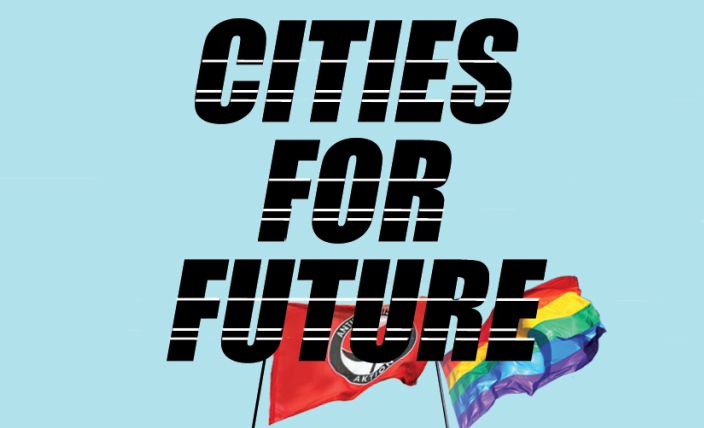The Communal Forum intends to share experiences regarding local left solutions to housing and issues of mobility. To this end, it will gather city councillors and experts from all over Europe to build a network and discuss a path to better cities for tomorrow, looking at both social issues and the struggle against climate change.
Languages:
English, German, Spanish
Organised by
Party of the European Left and transform! europe
Programme
Friday, 22 October
18.00 – 19.45: How to win a city – Successful experiences of the left and lessons to learn
Welcome remarks:
- Günther Hopfgartner, federal spokesperson KPÖ (Communist Party of Austria)
Speakers:
- Marta Kiš, Member of the City Council of Zagreb for the Platforma Možemo!
- Iva Marčetić, feminist architect (Zagreb)
- Paul Stubbs, sociologist
- Max Zirngast, Member of the City Council of Graz, KPÖ
Saturday, 23 October
9.00 – 11.30: Opening plenary: Current crisis of housing and mobility/traffic in big cities
interpretation: English, German, Spanish
Speakers:
- Mia Haglund, Member of the City Council of Helsinki, Left Alliance
- Ana Correia da Veiga, Member of the City Council of Luxembourg-City, Dei Lenk (The Left)
- Michael Schmida, Member of the City Council of Linz (Upper Austria) and expert of transport/traffic, KPÖ
- Mercedes Vidal, Member of the City Council of Barcelona, EUiA (United and Alternative Left / Esquerra Unida i Alternativa)
- Andrej Holm, researcher in urban sociology at the Humboldt-University Berlin, housing activist and policy advisor, Die LINKE
Moderation:
- Heide Hammer, Member of the Executive Board of the Party of the European Left
11.30 – 11.45: Coffee break
11.45 – 13.30: Workshops (see below)
13.30 – 14.30: Lunch break
14.30 – 16.00: Workshops (see below)
16.00 – 16.30: Coffee break
16.30 – 18:00: Closing plenary: How to connect left concepts and communal politics
interpretation: English, German, Spanish
Speakers:
- Katalin Gennburg, Member of the City Council of Berlin, Die LINKE
- Maria Manuel Rola, Member of Portuguese Parliament, Bloco de Esquerda
- Rubén Perez, head of local policies for Izquierda Unida, Spain
- Nikos Belavilas, professor at the National Technical University of Athens (NTUA), Member of the City Council of Piraeus, Syriza
Moderation:
- Waltraud Fritz, Member of the Political Secretariat of the Party of the European Left
Workshops
A) Home belongs to those who live in it: rent cap and affordable housing
Inputs from:
- Katerina Knitou, responsible for communal politics in the political bureau of Syriza
- Kay-Michael Dankl, Member of the City Council of Salzburg (Austria), KPÖplus
- Andrej Holm, researcher in urban sociology at the Humboldt-University Berlin, housing activist and policy advisor, Die LINKE
- Vasco Barata, lawyer and activist, CULTRA (Portugal)
Left forces in every city are facing a rather grim reality. Uncontrolled rise of housing prices is leading to unaffordable mortgage and very high rents, leading to evictions and homelessness. We want to share our experiences in organising campaigns: one of the best-known examples is Berlin, where the fight against evictions of renters has become a crucial political issue.
B) Urbanism vs. Profit: claim your city back
interpretation: English, German, Spanish
Inputs from:
- Nikos Belavilas, professor at the National Technical University of Athens (NTUA), Member of the City Council of Piraeus, Syriza
- Karlos Renedo, lawyer and activist, Sortu party (Basque country)
- Rubén Perez, head of local policies for Izquierda Unida (Spain)
- Katalin Gennburg, Member of the City Council of Berlin, Die LINKE
- Maria Manuel Rola, MP and responsible for housing, Bloco de Esquerda (Portugal)
Space in big urban conglomerates is a precious good and it cannot be a privilege of the rich. Left concepts for creating spaces for all, and for all generations is a challenge in times where we need at the same time to avoid further extensive consumption of land and selling of grounds. What are the experiences of the left in Europe? A variety of topics can be discussed: homelessness, syndicate movements, urban gardening, solidarity-based economy, social centres, basic energy security benefits, Sanctuary Cities and Refugee Housing.
C) Can commuting be sustainable?
interpretation: English, German, Spanish
Inputs from:
- Judith Dellheim, senior research fellow for Rosa-Luxemburg-Foundation ( Germany)
- Angelika Lorenz and David Sagner, activists from “Lobau remains” (Lobau Bleibt)
- Michael Schmida, Member of the City Council of Linz (Upper Austria) and expert of transport/traffic, KPÖ
- Pierre Eyben, Member of the City Council of Liege, Demain (Belgium)
What is the relationship between the protests in Austria (Lobau Bleibt) and other social movements (climate activism) in Europe? What can we learn from each other? How can we support each other? Which protest methods are sustainable and effetive? How to mitigate the risks of social exclusion, turning commuting by car into another social privilege thus reducing climate friendly and CO2-neutral lifestyle to the poorer half of society?
The challenge is, on the one hand, to develop and implement concrete concepts to reduce the social and ecological burdens of commuting. On the other hand, the concepts and their realisation should help to make living in the city more attractive for everyone, especially for the socially weakest. Thirdly, this work and policy should help to make society more social, just, ecological and solidary – to initiate and promote a social-ecological transformation.
D) Streets like ravines: cities for people, not for cars!
interpretation: English, German
Inputs from:
- Detlef Tabbert, Mayor of Templin, Die LINKE
- Mia Haglund, Member of the City Council of Helsinki, Left Alliance
- Ana Correia da Veiga, City Councillor of Luxembourg-City, Dei Lenk
Is free public transport enough – for the environment AND the people? How to discourage people to use their private cars, avoiding social exclusion? What can we learn from experiences in Luxemburg and other places where, thanks to left political engagement, free public transport has been introduced some years ago? Activists from different countries will share this experience and we will try to find strategies to extend it to other cities and contexts.
